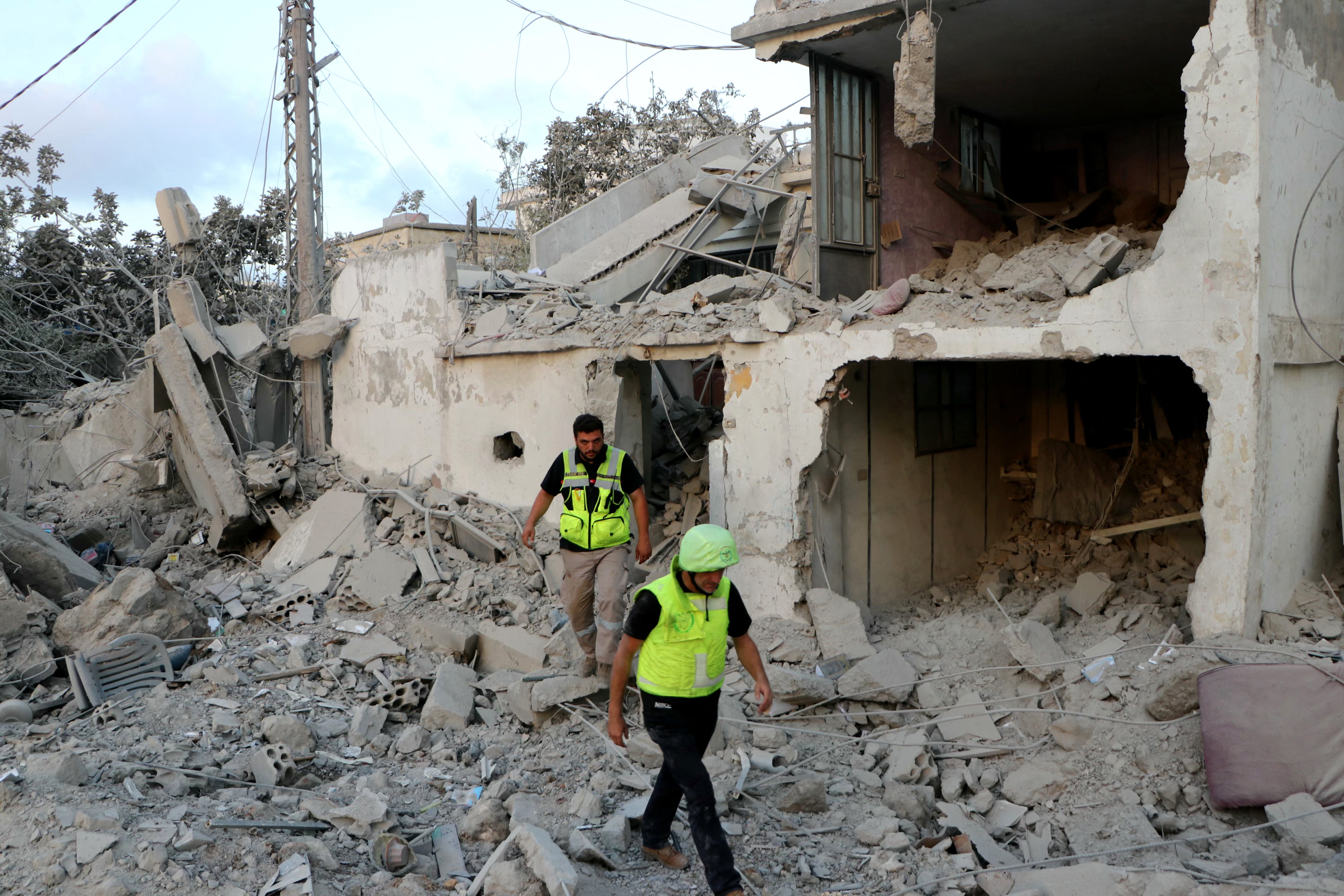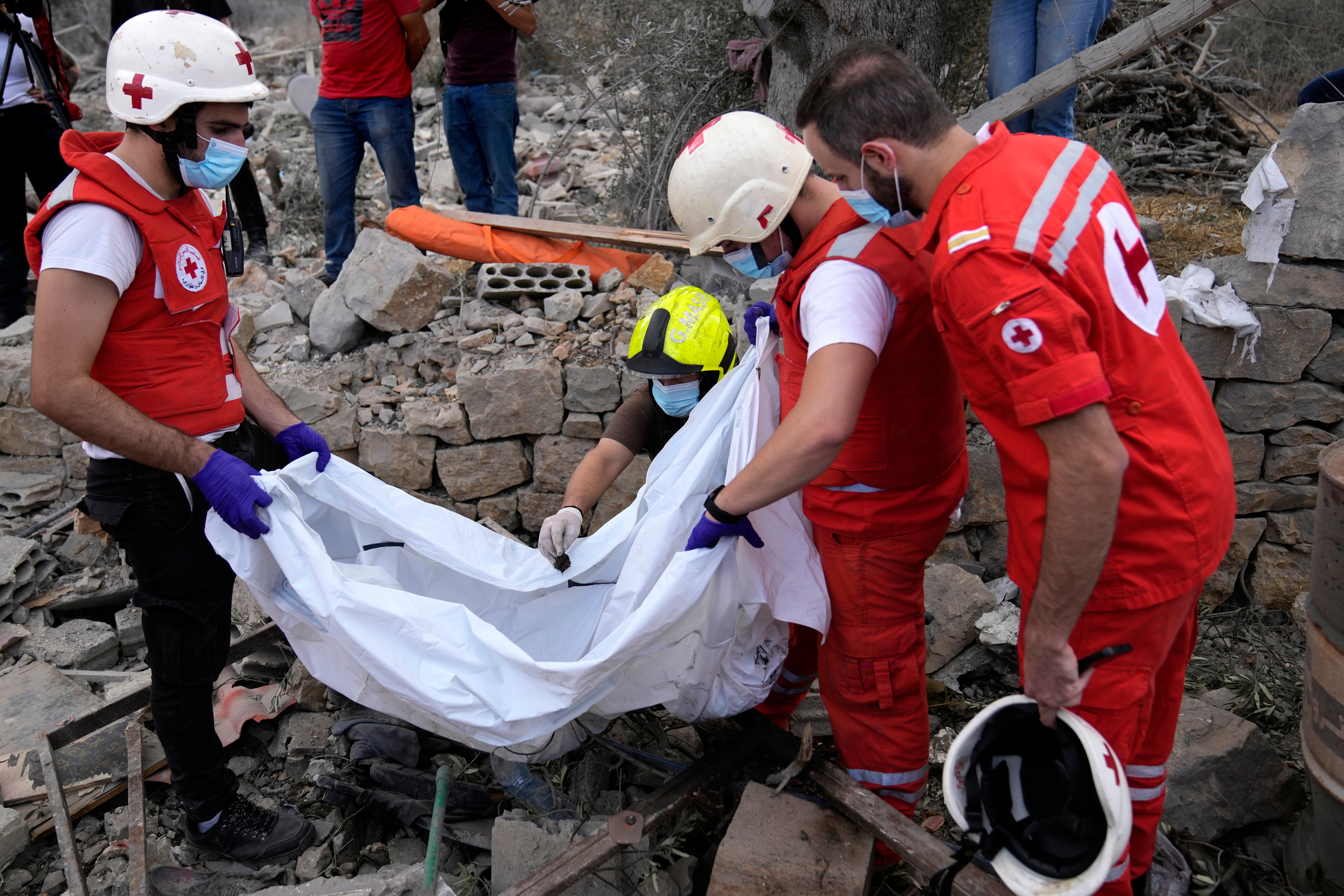Israel has launched airstrikes on Beirut for the first time in five days, while a city mayor has been been killed during a volley of intense strikes on southern Lebanon – in what the country’s prime minister has condemned as “intentionally” targeting a municipal council meeting.
The strikes come despite US concerns about rising death tolls and fears of all-out war in the region as Israel targets Iran-backed Hezbollah in Lebanon and is at war with Hamas – also supported by Tehran – in Gaza.
Israel’s army confirmed that it hit the city of Nabatieh in southern Lebanon, where mayor mayor Ahmed Kahil was among the five dead. Eyewitnesses in Nabatieh described scenes of “frantic terror” to the BBC as multiple airstrikes hit within 30 minutes.
Strikes continued across Lebanon, including in the eastern Bekaa Valley and Nabatiyeh, in southern Lebanon, where the Israeli military said it targeted Hezbollah command centers and weapons facilities that had been embedded in civilian areas. Hezbollah launched more than 90 projectiles towards Israel on Wednesday, wounding four civilians, according to Israel Rescue Services.
During an assessment of the situation in Israel’s north on Wednesday, Israel’s Defense Minister Yoav Gallant said Israel was gleaning intelligence from their capture of Hezbollah militants that was significantly weakening Hezbollah’s ability to launch attacks. “We will conduct negotiations under fire, I said that on the first day, I said it in Gaza, I said it here – this is our tool,” he told soldiers operating in southern Lebanon.
The Israeli army also said it conducted a strike on an underground Hezbollah weapons stockpile in the southern Beirut suburb of Dahiyeh. “Prior to the strike, numerous steps were taken to mitigate the risk of harming civilians, including advancing warnings to the population in the area,” the Israeli military said.
Israeli navy forces, meanwhile, struck dozens of Hezbollah targets in southern Lebanon, in cooperation with troops on the ground, Israel’s military added.
On the Nabatieh strikes, Lebanese Prime Minister Najib Mikati accused Israel of “intentionally targeted a meeting of the municipal council”.
Some Western countries have been pushing for a ceasefire between the two neighbours, as well as in Gaza, though the United States says it continues to support Israel and was sending an anti-missile system and troops.
Mr Mikati questioned the use of demanding a ceasefire from the UN, “if all the countries of the world are unable to deter a blatant aggression against the Lebanese people”.
“What solution can be hoped for in light of this reality?” he said.
Lebanon‘s Civil Defense said 15 bodies had been recovered from the rubble of a building in the southern Lebanese town of Qana. There was no immediate comment from the Israeli military. Israel said the target was Jalal Mustafa Hariri, Hezbollah’s commander in charge of the Qana area.
Qana has long been associated with civilian deaths after Israeli strikes during previous conflicts with Hezbollah. In 1996, Israeli artillery shelling on a United Nations (UN) compound housing hundreds of displaced people in Qana killed at least 100 civilians, including four UN peacekeepers.

On Tuesday, State Department spokesperson Matthew Miller said the US had expressed its concerns to Prime Minister Benjamin Netanyahu’s administration on the recent strikes.
“There are specific strikes that it would be appropriate for Israel to carry out, but when it comes to the scope and nature of the bombing campaign that we saw in Beirut over the past few weeks, it’s something that we made clear to the government of Israel we had concerns with and we are opposed to,” Mr Miller also told reporters Tuesday.
The last time Beirut was hit was on 10 October, when two strikes near the city centre killed 22 people and brought down entire buildings in a densely populated neighbourhood.
Hezbollah and Israel started trading near-daily cross-border fire in the wake of Israel launching its war in Gaza in retaliation for the 7 October attack on Israel by Hamas, in which around 1,200 people were killed and 251 taken hostage.

Israel’s retaliatory air and ground assault in Gaza has killed more than 42,000 people, according to the latest update from the health ministry in Hamas-run Gaza and has led to more than 90 per cent of the territory’s population being displaced.
More than 1,400 people have been killed in Lebanon since Israel stepped up its campaign against Hezbollah last month. More than 2,000 people have died in the country since the 7 October attack.
Hezbollah has a strong presence in southern Beirut but it is also home to a large number of civilians and people unaffiliated with the militant group.
Israel’s military posted an evacuation warning early Wednesday on X, formerly Twitter, ahead of the strike, saying it was targeting one building in the Haret Hreik neighbourhood.
“Prior to the strike, numerous steps were taken to mitigate the risk of harming civilians, including advancing warnings to the population in the area,” the Israeli military said.
Israel has also come under scrutiny because of its dealings with the UN peacekeeping force UNIFIL in south Lebanon. Since an Israeli ground operation against Hezbollah militants began on 1 October, UNIFIL positions have come under fire and two Israeli tanks burst through the gates of one of its bases, the UN says. Five peacekeepers have been injured.
European Union countries that contribute have no intention of pulling back despite Israeli calls to do so, Austrian Foreign Minister Alexander Schallenberg said.
Sixteen EU countries, including Austria, contribute to UNIFIL and the recent incidents have sparked widespread alarm among European governments.

